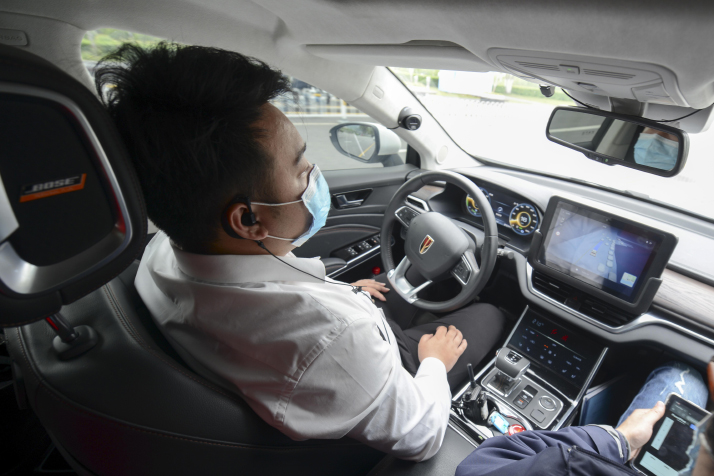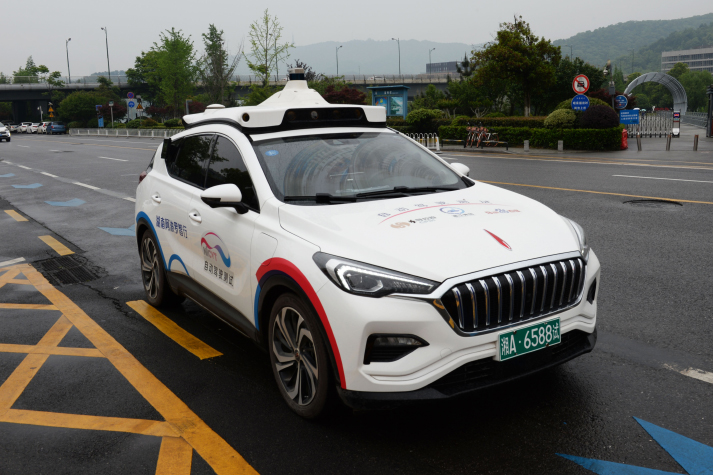|
||||||||||
| Home Nation World Business Opinion Lifestyle ChinAfrica Multimedia Columnists Documents Special Reports |
|
||||||||||
| Home Nation World Business Opinion Lifestyle ChinAfrica Multimedia Columnists Documents Special Reports |
| ChinAfrica |
| Research and development of self-driven taxi booms in China |
| Research and development of self-driven taxi booms in China, but large-scale commercial deployment is still far away |
| By Ge Lijun VOL.12 August ·2020-08-17 |


A significant first step
In 2020, Robotaxi, a concept that originated in Silicon Valley in the United States, gained momentum in China. Companies like Baidu, WeRide, DiDi and Amap announced their plans to enter this field one after the other.
Robotaxi services are already available in several Chinese cities such as Guangzhou, Changsha and Shanghai, while Beijing and Suzhou are getting ready to launch trials.
Waymo One, the world's first Robotaxi service, was launched in the U.S. City of Phoenix in December 2018. The technology is supported by Alphabet, Google's parent company.
In China, in September 2019, Baidu Apollo launched its trials of Robotaxi services in Changsha, marking an important step in this area. Other companies quickly followed suit in 2020.
This rapid development is fueled by China's so-called "new infrastructure" construction. This year, the National Development and Reform Commission, China's top macroeconomic planner, elaborated for the first time the scope of such new infrastructure.
"Among its seven areas, four are related to ICVs, including 5G, artificial intelligence, the construction of vehicle charging stations and big data centers," Zhang Dezhao, COO of Chinese technology company Zhixingzhe, told China Automotive News.
Supporting policies have also played a role in accelerating the development of the autonomous vehicle sector. Earlier this year, China unveiled a plan to boost autonomous driving throughout the country. According to the plan, the country will achieve "large-scale production of vehicles capable of autonomous driving and marketing of high-level autonomous vehicles by 2025."
In a further boost to the industry, the Ministry of Industry and Information Technology (MIIT) launched classification standards for autonomous driving in China in March. These standards will be implemented from January 1, 2021.
According to the Society of Automotive Engineers, the classification of automation is divided into six levels ranging from L0 to L5 (L5 meaning full automation). In China, the level is generally around L3. According to industry insiders, the current Robotaxi technology has now reached L4 level.
MIIT Minister Miao Wei said in 2020, the value of Chinese ICV market could reach more than 100 billion yuan ($14 billion). The ministry estimates that the market will experience rapid development for at least 20 years. By 2035, it will account for around 25 percent of the global new car market.
However, autonomous driving is still far from large-scale commercialization in China. Self-driving without safety supervisors on board is not allowed. The construction of necessary infrastructure has just started and the cars' ability to cope with complex road conditions is still limited. Autonomous cars are only allowed in restricted areas, under certain weather conditions and during given hours. They are required to maintain a relatively low speed, which makes self-driving less practical. The cost of the cars is also very high. Meng from DiDi Autonomous Driving said the price of a DiDi Robotaxi is more than 1 million yuan ($140,000).
DiDi acknowledges that these are all major issues. "Autonomous driving will require at least 10 years of continuous investment to become fully mature in technical, commercial, regulatory and legal terms. We also have to prepare for coming difficulties and challenges, but our direction is clear and firm," said Cheng Wei, founder and CEO of DiDi.
In the meantime, many people are more than willing to experiment with this new technology. Jia Yin, a teacher in his 60s living in Shanghai, saw the live broadcast of DiDi's self-driving cars and was so excited that he decided to book a seat to try it out. The next day, Jia drove for more than an hour in his own car to have a go at an autonomous car for 10 minutes. "It's quite fun," he said as he got out of the car. "However, braking and acceleration are still not very smooth."
(Print Edition Title: Cars of the Future)
Comments to glj@chinafrica.cn
| About Us | Contact Us | Advertise with Us | Subscribe |
| Copyright Beijing Review All rights reserved 京ICP备08005356号-5 京公网安备110102005860号 |